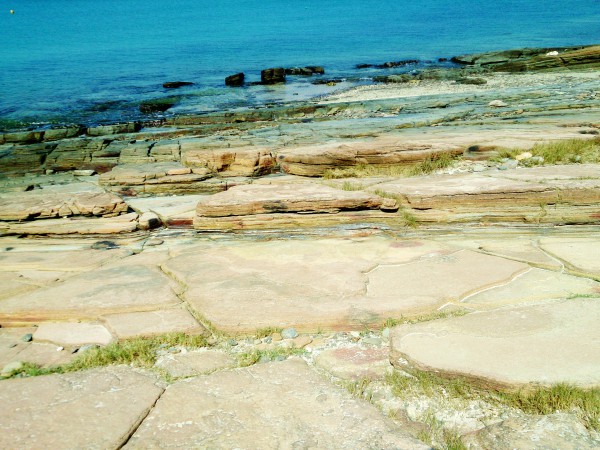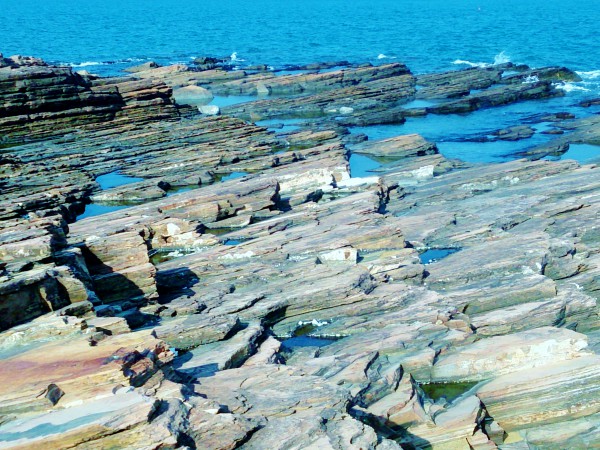Learn 學習
= Field recording workshops in Hong Kong 香港田野錄音工作坊 =
2014.11.14-15
2014.11.15@Tung Ping Chau 東平洲
Although I lose all the recordings as my recorder dropped into the sea during the workshop, I still remember the sounds of waves hitting the rocks, passing through the cracks, washing the stone on the shore, and the echoes in the rock chambers. I was thinking if I were a tiny mussel attached on the giant rock, listening to the waves and waiting the waves come.
雖然我在工作坊進行期間把錄音機掉進海裡,失去了所有聲音紀錄,但我仍然記得海浪拍打岩石、穿過裂縫、刷過岸邊石頭的聲音。我想像自己是隻依附在大岩石上的小貝殼,靜候海浪的到來,聆聽海浪的聲音。


:: Afterthought 再思 ::
跟澎葉生(Yannick)進行這次工作坊確實是很好的體驗,不僅提高了採聲的技巧,而且學會如何以不同的方法,來跟大自然進行觀察與互動。作為一個對自然與生態感興趣的人,當我探索大自然的時候,習慣識別各種物種及拍攝來進行記錄,仿佛是個局外人一樣。然而,這個工作坊使我重新思考環境跟我的關係,我真的從澎葉生裡學到很多東西。
= 台灣考察及創作 Taiwan’s Field Trip and Creation =
2015.4.3-7 @ Taipei, Kaohsiung, Meinung 台北, 高雄, 美濃
About artwork 關於作品
Tideline 潮間線 (11” 19’)
:: Afterthought 再思 ::
Time really flies.
I still remember last October the program started, we sit together in soundpocket’s office sharing our own listening experience, and then we spent a day on Tong Ping Chau, walked along on the Wong Nai Chung Gap Trail, and of course explored different places in Kaohsiung, Taiwan. It is funny that all the places are full of sound of water: from streams to the sea shores, from beaches to the harbors.
As a person who mainly working with photography, I started thinking what sounds really mean to me. We listen to sounds and look at objects everyday, but why most of us taking photographs instead of recording sounds? If taking photograph is a way to capture and conserve a single moment (which I believe in), and what is the point for someone try to record the sounds? is he or she trying to capture a series of moments in a sonic way?
Some researchers found out that we can only understand the world approximately 80% by receiving information through watching. For me, understanding the world by the sense of sight seems kind of passive. It is like you are an outsider of the society, the outsider of the environment you living in. During the program, I tried to understand the world a little bit more through listening, and it made me more curious: I want to trace the strange sound I heard, I want to ask someone if they heard the same sound.
Also it made me started review my pervious works. I think I am a fair observer, but I am not a good artist, as I can not see myself in my works. During the trip to Kaohsiung, I met Mr. Chan, a stranger living in the Military dependents’ village at Cijin , we talked about the history of his family, and wandered around the village. I can not remember what he actually said ( luckily I recorded our communication), I felt we are so close because it is like I was experiencing his life. I believe listening help me to understand the 20% of the world, by making me more active, more sensitive, and being connected with people and things around me.
Thank you soundpocket for hosting this program, also thank you Yannick and artists sharing their experience with me. I believe we will continue exploring the world by listening, making some noise for the future.
時間過得真快。
我還記得去年十月計劃開始的時候,我們在聲音掏腰包的辦公室裡分享自己的聆聽體驗,然後我們一起去了東平洲一整天,走過黃泥涌峽徑,亦探索過台灣高雄不少地方。最有趣的是這些地方都充滿水聲:由山川到海岸,由海灘到港口。
作為一個以攝影為主的創作人來說,我開始思考聲音對我來說有什麼意義。我們每日同樣地聽到不同的聲音,看到不同的物件,但為何大部分人只會利用攝影來記錄世界而不去採聲?要是拍攝照片是為了捕捉與保存當下一刻(我相信),那麼,當有人嘗試採聲的時候又是怎樣的一回事?是他或她嘗試用聲音捕捉一連串的時刻?
一些研究人員發現,我們透過觀看接收的訊息來認識的世界大概只有80%。對我來說,單純地通過視覺來認識世界似乎有點被動,這仿佛是社會、環境以外的人一樣,在計劃進行期間,我嘗試透過聆聽來了解世界多一點,我對這個世界變得更好奇:我會追尋一些古怪聲音的來源,亦會問人是否聽到相同的聲音。
此外,聆聽使我重新檢視我過往的作品,我希望自己是個客觀的觀察者,但我不是個好的藝術家,因我不能在自己的作品中看到自己。在高雄期間,我認識一個住在眷村旗津的陌生人陳先生, 我們在村內徘徊,談到他家族的歷史。雖然我忘了他確實地說了什麼(幸好我記錄了我們的對話),但我仿佛經歷了他的生命,因而令我感到我們非常親近。我相信,聆聽使我理解餘下20%的世界,使我更積極、更敏感地聯繫身邊的人與事。
感謝聲音掏腰包主辦這項計劃,亦感謝澎葉生與一眾藝術家跟我分享他們的經驗。 我相信我們會繼續以聆聽來探索世界,更為未來發出不同的聲音。